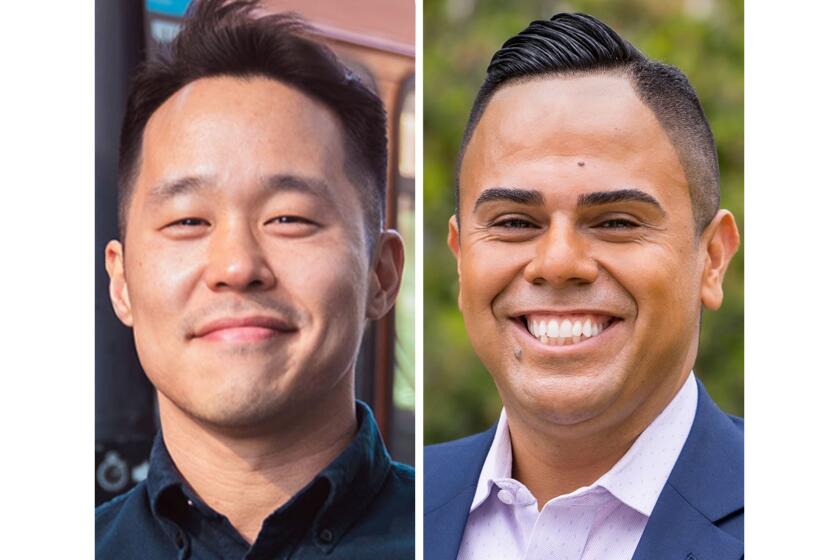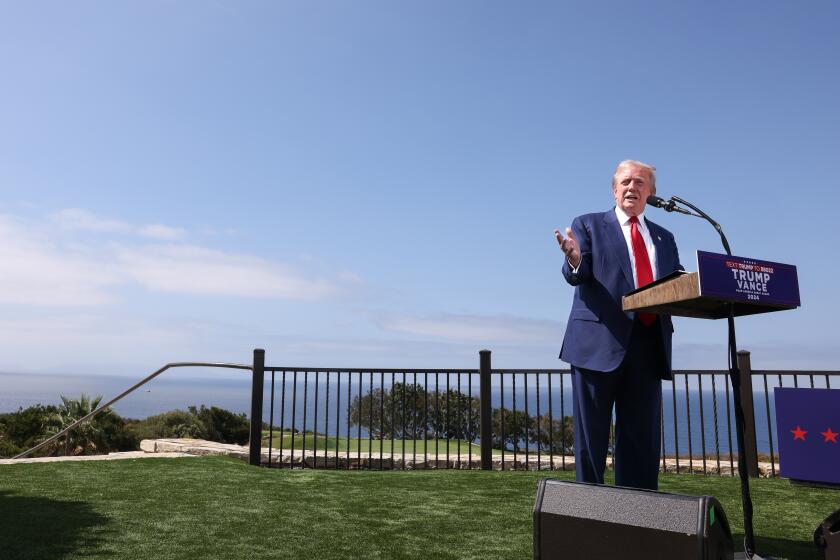On the Media: Candidates are MIA during 2010 elections campaign
The Courier-Times--Telegraph arrives on driveways in Tyler, Texas, on Sundays with a pleasant thud. It can be thicker than a rib-eye steak and flecked with the sort of small-government red meat that satisfies the palates of its conservative readers.
So the paper startled some readers last weekend when it ran a rare front-page editorial, one that took aim at the state’s Republican governor. The piece urged Rick Perry to reverse his “unacceptable and undeserved silence” to debate his Democratic opponent and to meet with newspaper editorial boards, as he has in years past.
Publisher Nelson Clyde said he’s disturbed by a trend in the current midterm election in which some politicians hide out or speak only through a few friendly news outlets. “For me, from a journalist’s point of view, I think this is really going to polarize us and the media further,” Clyde said in an interview. “It’s a regrettable circumstance.”
Regrettable, but maybe the new normal. Politico has declared this the “Year of the Missing Candidate,” with politicians disdaining debates, appearing rarely in public, declining to release public schedules to reporters and shunning interviews with all but the most compliant journalists.
Many Americans may believe the media are biased. Politicians are wielding that notion, still not true most of the time, to excuse their pronounced absence from the public arena. The ref’s being banished from the ring, while the boxers tell us they wouldn’t think of throwing a sucker punch.
Candidate Barack Obama alienated the national press corps during portions of the 2008 campaign, making himself scarce for questions and shrinking away when reporters pulled out their tape recorders. During one notable period of more than a month before election day, he took few questions and held no formal news conferences.
But Obama’s campaign plane seems like a cozy welcome wagon compared to the chilly vehicles plying the trail in Campaign 2010. The duck-and-dodge has been primarily, but not exclusively, a tactic among Republicans, according to Politico and several other news outlets. But more than one Democrat has gone to lengths to minimize unscripted moments too.
It would be nice to think we’re passing through a brief era of absentee candidates. But don’t count on it. The profusion of news outlets, many calibrated to a particular ideology, enable candidates to shop for preferred messengers. Or they can take to the Internet to cut out media intermediaries altogether.
In Wisconsin, reporters from many media outlets have complained about trying to cover U.S. Senate candidate Ron Johnson, who won’t put out his daily schedule. The Milwaukee Journal-Sentinel reported Thursday that a campaign spokeswoman said the Republican Johnson would take his message, “directly to the people.” It’s a little better with incumbent Russ Feingold, the Democrat, who doesn’t give out an advance schedule either, but will at least confirm dates after they have been set.
In Delaware, “tea party” favorite Christine O’Donnell has made herself so invisible in the U.S. Senate race that she faced questions about whether she had gone into hiding. A CNN reporter chased after her in one report this week, but O’Donnell slipped out the back door after an event. As an SUV whisked her into the night she promised to answer questions. Some day.
In Colorado, Senate hopeful Ken Buck went nine consecutive days without a public event. But the Republican promised to show his face more this month, now that a crucial fundraising period has passed.
Marco Rubio, the frontrunner for U.S. Senate from Florida, launched a bus tour this week but one group was noticeably not on board: the media. Reporters can chase the bus if they like. But the Republican candidate has a substantial lead. So he’s following a time-honored tradition in both parties of sitting on his advantage and avoiding pesky reporters, who present considerable risk and little potential reward.
In the tight Nevada senate race, reporters can’t get much love from either incumbent Harry Reid, the Democrat, or GOP challenger Sharron Angle. Reid has a history of spouting malaprops, while “tea partyer” Angle has preferred to speak through friendly outlets like Fox News. Veteran political reporter Jon Ralston of the Las Vegas Sun told Politico the scant access to the candidates was “unprecedented.”
All this has not stopped the media from needling, cajoling and pleading for more face time. And shame can still bear its rewards. Witness the fallout from an incident last March in the California gubernatorial race.
The episode began with Republican candidate Meg Whitman inviting reporters to an event at the Port of Oakland. The journalists waited a couple of hours in a holding pen at a Union Pacific rail yard. When the time finally came for questions at the “open press” event, Whitman staffers instead shooed away the reporters. Video of the Whitman’s uneasy silence aired widely on Bay Area television. The candidate called reporters to apologize. She has gotten more accessible since then.
Whitman opponent Jerry Brown could be held up as Exhibit One by nervous campaign managers who want to minimize contact with the media. During an unscripted moment last month, the attorney general managed to raise the adulterous past of Democratic icon Bill Clinton. Caught on a jogging path by a reporter one weekend in June, Brown uncorked a doozy — comparing Whitman to Nazi propagandist Joseph Goebbels.
Those are the kinds of remarks that have candidates apologizing and back-pedaling for days, instead of delivering the message their campaigns want to harp on.
Longtime Republican political strategist Dan Schnur said he doesn’t see any slowing of the trend toward candidates hiding out or facing only friendly media. News outlets will likely enable the process, he said, by hunkering down into increasingly isolated ideological corners.
And the perception of a biased media will give politicians the excuse to shut out even the many reporters who still try to be honest arbiters.
The result will be candidates able to remain, more and more, “on message.” And a public that knows less and less about who the politicians really are.
james.rainey@latimes.com
Twitter: latimesrainey
More to Read
Get the L.A. Times Politics newsletter
Deeply reported insights into legislation, politics and policy from Sacramento, Washington and beyond. In your inbox three times per week.
You may occasionally receive promotional content from the Los Angeles Times.











